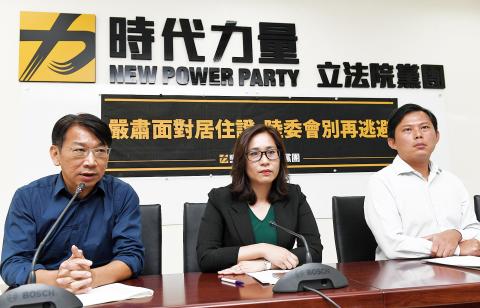The New Power Party (NPP) yesterday slammed the Mainland Affairs Council for its “near incompetence” regarding China’s new measure to issue residency cards to Taiwanese and called for more concrete countermeasures from the Taiwanese government.
“Although China unveiled the measure well before last week, the council did not state any plans to counter it until the party [on Tuesday] last week advocated amending the Act Governing Relations Between the People of the Taiwan Area and the Mainland Area (台灣地區與大陸地區人民關係條例) so that card holders would be treated the same as those with household registration in China by requiring them to report to the Taiwanese government,” NPP Legislator and party caucus whip Hsu Yung-ming (徐永明) told a news conference in Taipei.
Although the council finally announced on Thursday last week that card holders would be required to report to the authorities, it has yet to decide whether to suspend or cancel card holders’ household registration in Taiwan, he said.

Photo: CNA
A tougher approach and more concrete countermeasures from the government would not restrict the rights of Taiwanese living in China, but rather “offer them more bargaining chips when negotiating with Chinese authorities and prevent them from being pressured into applying for the card,” he added.
The council’s attitude toward China has been “not only timid, but nearly incompetent,” NPP Executive Chairman Huang Kuo-chang (黃國昌) said.
“Taiwanese have all been wondering what the council and the Straits Exchange Foundation have been doing. If they cannot propose any concrete countermeasures, we might as well get the Executive Yuan to put them under the Ministry of Foreign Affairs,” he said.
Hsu said the party would be meeting with Mainland Affairs Council Minister Chen Ming-tong (陳明通) to get an idea of how many Taiwanese have applied for the card, whether Taiwanese have been forced to apply — and, if so, who are more likely to be pressured — and how the council plans to respond to China, adding that the party would share what it learns at the meeting with the public.
While Democratic Progressive Party Legislator Wang Ding-yu (王定宇) plans to propose a draft amendment similar to the NPP bill, Hsu said he hopes that other DPP members would also support the effort.
The Chinese State Council Information Office announced on Aug. 16 that from this month, Taiwanese, Hong Kongers and Macanese who have lived in China for more than six months and are legally working, living or studying in the country would be eligible to apply for a residency card.
Card holders would be granted certain rights and benefits enjoyed by Chinese citizens, such as compulsory education, social insurance and housing subsidies.

The CIA has a message for Chinese government officials worried about their place in Chinese President Xi Jinping’s (習近平) government: Come work with us. The agency released two Mandarin-language videos on social media on Thursday inviting disgruntled officials to contact the CIA. The recruitment videos posted on YouTube and X racked up more than 5 million views combined in their first day. The outreach comes as CIA Director John Ratcliffe has vowed to boost the agency’s use of intelligence from human sources and its focus on China, which has recently targeted US officials with its own espionage operations. The videos are “aimed at

STEADFAST FRIEND: The bills encourage increased Taiwan-US engagement and address China’s distortion of UN Resolution 2758 to isolate Taiwan internationally The Presidential Office yesterday thanked the US House of Representatives for unanimously passing two Taiwan-related bills highlighting its solid support for Taiwan’s democracy and global participation, and for deepening bilateral relations. One of the bills, the Taiwan Assurance Implementation Act, requires the US Department of State to periodically review its guidelines for engagement with Taiwan, and report to the US Congress on the guidelines and plans to lift self-imposed limitations on US-Taiwan engagement. The other bill is the Taiwan International Solidarity Act, which clarifies that UN Resolution 2758 does not address the issue of the representation of Taiwan or its people in

US Indo-Pacific Commander Admiral Samuel Paparo on Friday expressed concern over the rate at which China is diversifying its military exercises, the Financial Times (FT) reported on Saturday. “The rates of change on the depth and breadth of their exercises is the one non-linear effect that I’ve seen in the last year that wakes me up at night or keeps me up at night,” Paparo was quoted by FT as saying while attending the annual Sedona Forum at the McCain Institute in Arizona. Paparo also expressed concern over the speed with which China was expanding its military. While the US

SHIFT: Taiwan’s better-than-expected first-quarter GDP and signs of weakness in the US have driven global capital back to emerging markets, the central bank head said The central bank yesterday blamed market speculation for the steep rise in the local currency, and urged exporters and financial institutions to stay calm and stop panic sell-offs to avoid hurting their own profitability. The nation’s top monetary policymaker said that it would step in, if necessary, to maintain order and stability in the foreign exchange market. The remarks came as the NT dollar yesterday closed up NT$0.919 to NT$30.145 against the US dollar in Taipei trading, after rising as high as NT$29.59 in intraday trading. The local currency has surged 5.85 percent against the greenback over the past two sessions, central